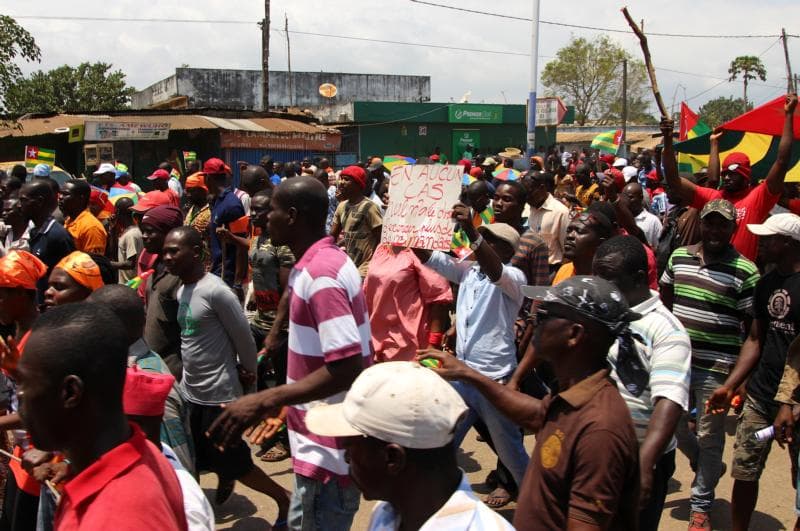YAOUNDÉ, Cameroon – In Togo,the bishops are expressing concern over the ethnic and religious overtones appearing in the West African nation’s ongoing political crisis.
Thousands of demonstrators have been on the streets calling on President Faure Gnassingbé to step down, and for the country to re-introduce term limits.
Gnassingbé has been president since 2005, following the death of his father, Gnassingbé Eyadéma.
Eyadéma had ruled Togo for 38 years, ever since he overthrew the country’s second president, Nicolas Grunitzky, in a coup d’état in 1967.
At least 16 people have been killed in the protests since August.
In the beginning, the bishops called the protests a result of pent-up frustrations, and called for them to be peaceful. At the same time, the bishops supported the call for term limits.
The Togolese bishops discussed the issue during their 166th ordinary session, which took place October 17-20 in Kpalimé.
“Faced with the surge in violence recorded in our country these last weeks, the bishops once more condemned all acts of violence no matter where they are coming from, and called on all to exercise restraint in order to make sure that our country does not sink into a situation of chaos,” Father Gustave Wanme, the secretary general of the bishops’ conference, said in a statement.
The day before the bishops began meeting, Muslim religious leader Djobo Mohamed Alassani, a local representative of the opposition Pan-African National Party, was arrested in the northern town of Sokodé, sparking a wave of violence that led to the deaths of two soldiers and two civilians, with over 20 people wounded.
RELATED: Togo bishop condemns ‘indiscriminate brutality’ by security forces
Gnassingbé is a Christian. The country is just under 30 percent Christian and 20 percent Muslim, while 50 percent practice indigenous religions.
“The bishops deplored the fact that the events of these last days have, beyond all expectations, taken an ethnic and religious trend, with the appearance of militias, the flight to exile of many of our compatriots; arrests; repression, the profaning and destruction of a mosque,” Wanme said.
The government justified the arrest of the imam, saying in a statement that he was picked following “repeated incitement and calls to violence, murder and sedition.”
But Gnassingbé has been accused of fanning ethnic tensions as a diversionary tactic from the substantive issue of presidential term limits.
“It is a dangerous twist,” the bishops said, evidently fearing a repeat of past ethnic violence in Togo.
Understanding Togo’s ethnic tensions
During Germany’s rule over Togo, members of the Ewe tribe in the south of the country were favored by the Germans and benefitted from missionary education. When the French succeeded the Germans in Togo after World War I, the Ewes became administrators for colonies throughout French Africa.
By the time Togo got its independence in 1960, the Ewes – who are the largest individual tribe in Togo, with about 30 percent of the population – had become the dominant group both in the administration and public service.
But the Ewe tribe was not the only one to have benefited from colonial policies.
The Kabye tribe of the north suffered economic backwardness and illiteracy, yet they had been recruited into the army under French rule, and at independence dominated the military. They still do so today, despite making up only between 15 and 20 percent of the population.
Between the Ewe and the Kabye in the center of the country are the Tem, the ethnic group to which Alassani belongs, and other smaller ethnic groups.
These ethnic divisions are reflected in the country’s political history.
Togo’s first president, Sylvanus Olympio was supported by the Ewes, but he was assassinated in a military coup in 1963, with Nicolas Grunitzky eventually taking power.
Under the rule of Olympio and Grunitsky, Ewes held almost 70 percent of the ministerial posts, with Kabye holding 20 percent.
But the fortunes of the two main groups changed on January 13, 1967, when Gnassingbé Eyadéma, an ethnic Kabye army colonel, took power in a bloodless coup. Suddenly, the Ewe tribe only had 25 percent of the cabinet positions.
Eyadéma repressed Ewe nationalism and other forms of dissent. When the wave of democracy swept the continent in the 1990s, the president instituted elections, which outside observers said were marred by electoral fraud.
At least 200 people were killed in 1998, after the president was accused of stealing the election.
Eyadéma introduced term limits in 1992, after a series of political protests, but ended them in 2002, with the hopes of running for re-election in 2008.
After his death in 2005, the military made sure his son succeeded him, causing more riots.
Both the 1998 and 2005 demonstrations took on an ethnic character.
Now there are fears of a repeat of history.
“Individuals are using social media to whip up ethnic hatred,” said Professor Ayayi Togoata Apédo-Amah of the University of Benin, and an opposition supporter.
“Our fight isn’t against any ethnic group. It is directed at a criminal and illegitimate regime…Giving a tribal coloration to this fight is a criminal diversion …the politics of ethnic scapegoatism is not part of the war of liberation for the Togolese people.”
The bishops have called for “frank and sincere dialogue” between the government and the opposition “on the key question that sparked the conflict in the first place,” in order to come up with a “durable, consensual solution.”
In a sign of hope a government spokesman on Monday said the president was willing to hold talks with the opposition.














